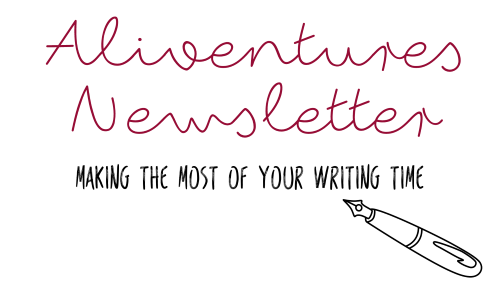Are you ever temtpted to give up on your writing?
I think almost everyone who's written for any length of time will have moments when it just all feels very hard going.
Maybe you're bogged down in the middle of a big project ... one that's already taken much longer than you expected (and the end isn't even in sight).
Maybe life has got in the way of your writing: things might be very challenging, emotionally draining, or simply hectic.
It's absolutely fine to take a break from writing, and often that's the most sensible thing to do.
But I know sometimes when you're struggling, it can feel tempting to just give up on writing altogether.
If that's where you are right now, I
hope some of these reasons to carry on will make it seem a little more worthwhile.
#1: Your Writing is Important (Even When it Doesn't Feel That Way)
We all deserve time to do the things that make us feel alive. The things that make us feel truly
ourselves.
For me (and I suspect for you too) one of those things is writing.
If you had plenty of money to live on, and no major commitments in your life, what would you choose to do with your time?
Personally, I'd write! (Maybe not all the time, but at least for a good chunk of it.) And if you feel the same way, then writing is a really important part of who you are.
It's fine if what you write doesn't reach a large readership, or even any readership at all. It's still worth spending time writing simply because you find it fulfilling.
#2: You Might Not Have Found the Type of Writing That Best Suits You (Yet)
In my early 20s, my dream was to make a living writing fiction, because that was the kind of writing I'd enjoyed in my teens (and the kind of writing that was most visible to me out there in the
world).
It wasn't until I started blogging – and soon after, freelancing for blogs – that I found a type of writing that would work out financially for me.
I still love writing fiction, but without the pressure of trying to make a living from it ... at least at this point in my
writing life.
If you're feeling stuck with your writing, or it's not working out how you hoped, then you might just not have found the right type of writing for you.
#3: It's Really Tough to Judge What's Working Best in Your Own Writing
As a writer, you probably have some sense of what's good and bad in your writing. When writing fiction, I know I'm good at dialogue and that I struggle with description, for instance.
But sometimes, I'm surprised by the success of a piece of writing that I didn't have any high hopes for. Perhaps
you've experienced the same thing: a short story that you dashed off to meet a deadline that placed well (or even won) in a competition, or a blog post that got a great response despite you feeling it was no better than the rest of your posts.
Plenty of authors experience this. Louisa May Alcott's much-loved children's novel Little Women was a great success (commercially and
critically) but this is what Alcott wrote in her journal during the drafting process:
"I plod away, though I don’t enjoy this sort of thing. Never liked girls or knew many, except my sisters; but our queer plays and experiences may prove interesting, though I doubt it."
#4: Nothing You Write is Every Wasted
I've written all sorts of things that – for one reason or another – are highly unlikely to ever be published.
Some of those were never intended for publication, chiefly the journals I keep for my children.
These run to a dozen or more notebooks now, handwritten, with a few sentences for each day.
But I've got plenty of other projects that were written with high hopes, like the novels I worked on during my teens and early 20s. Today, I can see that I still had a lot to learn as a writer when I embarked on those ... but the act of writing them was a big part of that learning.
Even if you have a "failed" writing project, you might gain a lot from it. Perhaps you've learnt:
- What planning and outlining techniques don't work for you
- What genres probably aren't a good fit for you
- How to make writing part of your daily or weekly routine
- Specific techniques (e.g. handling time jumps in your story)
Do take a break from
writing, if you need one. Do switch projects, if you've given your current piece a good shot and it just doesn't feel like it's working for you. But don't give up on writing altogether.
Happy writing,
Ali
P.S. If you missed last week's blog post, you can find it here:
What Can You Write About if You Don't Have Any Ideas?

